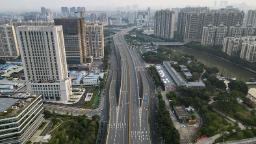
Hong Kong
CNN Business
—
China has locked down a major transportation hub in the south, as the country grapples with its largest nationwide Covid outbreak since April.
The lockdown also follows rising cases in Beijing, which reported the country’s first Covid deaths in nearly six months.
In recent days, China had begun to ease its harsh Covid restrictions, which had crippled local and international businesses for months. But, experts are worried that Beijing’s resolve to reopen the country may weaken now as cases rise once again.
Asian markets and oil prices slid on Monday as investors fretted about the prospect of China re-tightening Covid rules. The Hang Seng
(HSI) Index slid as much as 3.4% in the morning. It closed down 1.9%. Mainland China’s Shanghai Composite Index lost 0.4%.
Oil prices also fell, with US crude futures dropping 0.4% in Asian trading hours on Monday. Brent crude, the global oil benchmark, fell 0.6%.
Guangzhou, one of China’s largest cities with nearly 19 million residents, imposed a five-day lockdown in Baiyun district, which is home to one of the country’s busiest airports. Baiyun is also the most populous district in Guangzhou, housing 3.7 million people.
Schools will be shut, public transportation services will be suspended, and residents are advised to stay home, according to a statement posted by the Baiyun district government on WeChat on Monday.
The lockdown comes as Guangzhou scrambles to contain its worst Covid outbreak in three years. Guangzhou reported 8,181 cases on Sunday, bringing its total number of infection to over 80,000 since October 22.
There are rising fears that cities are once again coming to a standstill in the world’s second largest economy. From Guangzhou in the south to Zhengzhou in the central region, surging cases have forced local governments to step up lockdowns in the last few days. China on Sunday reported 26,824 new cases across the country.
Beijing, the country’s capital city, recorded three Covid deaths over the weekend. The Haidian district of the city has canceled in-person classes, according to a statement by the district government Sunday.
Shijiazhuang, the largest city in the northern province of Hebei, also re-imposed a five-day lockdown starting Monday, just a few days after it significantly loosened Covid rules.
The latest outbreaks could make it harder for China to unwind from its nearly three-year long “zero-Covid” policy.
On November 11, the central government eased some of its strict Covid restrictions. The move fueled hopes that China was shifting away from its draconian zero-tolerance approach, which had crippled its economy and largely isolated the country from the rest of the world for the past few years.
Markets rallied following the move, with Hong Kong’s Hang Seng Index up a combined 14% over three sessions and entering a technical bull market last Tuesday.
But the fresh lockdowns hit market sentiment on Monday.
“The keen driver of the prompt downside momentum is the growing unease that China will not loosen Covid lockdown policies because infections are rising again,” said Stephen Innes, managing partner of SPI Asset Management.
Goldman Sachs analysts said that the latest news on China’s Covid management has been “confusing” to investors.
“Our main message is that the first stage of reopening may be messy and bumpy, whereas the rebound after the initial hurdle could be very sharp,” they added, expecting China’s GDP growth to accelerate from 3% in 2022 to 4.5% in 2023.
— CNN’s Beijing bureau contributed to reporting.



